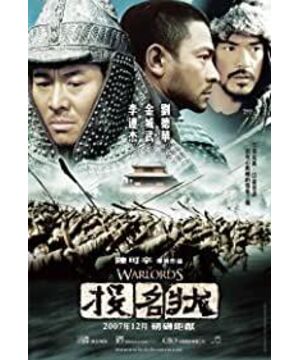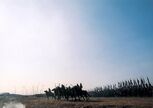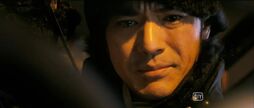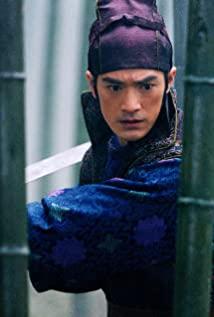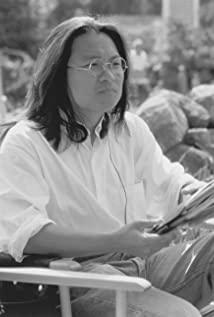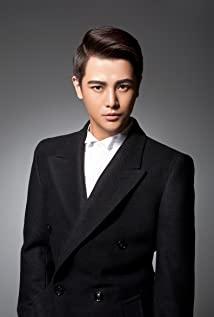Pang Qingyun:
Pang Qingyun, who climbed out of the dead, was hungry and desperate, because "the woman and the bowl of porridge he met" made him feel that he was still alive. An officer from the army is brave and resourceful, but he has been oppressed by his descendants and superiors in the Qing Dynasty for a long time. Because the friendly army stands by and the troops under his leadership are completely wiped out, he relies on pretending to be dead to survive. He, who was already in the doldrums, met Jiang Wuyang and Zhao Erhu when he was in despair, and his desire to return to the army and step into the center of power revived. Pang Qingyun's ambition and the encounter with Zhao and Jiang changed the fate of the three .
Pang Qingyun is the most complicated one among the characters in "The Name". He's ambitious and hungry for power; he's also ambitious, trying to change the real world by gaining power. He is proficient in combat skills and leadership, and has a lot of courage. He accepted the "voting certificate", but he did not believe in "voting the name certificate". In his own words, he "believed in Erhu and Wuyang". This kind of trust can be said to be the trust of brotherhood. Therefore, when he was besieged by the enemy, he could say, "We are really going to die here." At this time, he felt the pride of life and death among brothers. Of course, he is a soldier, and this trust can also be said to include trust in the abilities of Zhao and Jiang. He believes that they can help him achieve his ultimate goal. Therefore, he can also say to Wuyang: "Before being a bandit, you sacrificed for your brothers, but now you are a soldier, you can sacrifice for others." With the assistance of Zhao and Jiang, he saw the hope of moving towards the center of power. In order to achieve the final goal, he sacrificed the surrendered army of Suzhou City, and finally sacrificed Zhao Erhu. In his words, "One day, you'll know that I'm right." In his mind, gaining power is the best way to change the real world and protect the poor, and he firmly believes in it. When he was appointed governor of Jiangsu, he asked Cixi to be exempted from taxes for three years, which shows his political ideals.
"Pang Qingyun is a talent, but he doesn't know how to be an official." This is the evaluation of him by the old bureaucrats. Pang Qingyun has political ideals, and is willing to sacrifice for the ideal, sacrificing himself and others. However, the so-called ideal of Pang Qingyun, who came from a poor family, has obvious idealistic plots. He believes in top-down changes, and believes that through his own efforts, Da can help the world. However, how can a mere governor and a warrior change the world. Political naivety made him actually ask for a three-year tax reduction in Jiangsu when Cixi was appointed. In a situation where the civil and military affairs of the Manchu Dynasty and Lafayette were embarrassed, he was full of ambition and righteousness. Maybe he wanted to make amends, to make up for the Suzhou army who was slaughtered by him, and to make up for the promise he made to Erhu, but he didn't know that in the face of politics and reality, his ideal was just a shooting star across the night.
Pang Qingyun did not believe in the name-calling certificate, but he did believe in his brother. While arranging to shoot Zhao Erhu, he was really in pain, but his political ideals told him that sacrifice was necessary, "Xiao Qi, the dog is worth it." "Suzhou city people are worth it." "And you (Zhao Erhu) is also worth it."
Sacrificing Erhu and surrendering military power, Pang Qingyun naively thought that the ideal had come true. But Pang Qingyun was stabbed. In the intertwined fate of ideal and reality, he completed his vigorous but regrettable and tragic life. The moment he was shot, he truly felt the power of reality. He said to Wuyang: "Famous, fast!" He would rather die under his brother's "voice" than to die from the assassination of a political enemy. At the last moment of his life, Pang Qingyun, who did not believe in his name, died in his name. . The so-called "Qingyun" does not mean "Qingyun goes straight", and his name seems to have become an irony of his fate.
Zhao Erhu:
Erhu said: "The sky is big and the earth is not as great as the friendship between brothers. How can we live without brothers these days." "People who don't keep their promises are beasts." Joined the army, became a general, and enjoyed the glory, but in the end, he practiced the "voting name certificate" by sacrificing his own life. The name Erhu is actually quite interesting. Erhu and Ergou are common names for poor families. This is also in line with the identity and character of Erhu. And the number two seems to imply the tragic life that he can only be the second child. Before getting to know Pang Qingyun, Erhu was a bandit leader who responded to every call. But in the late Qing Dynasty, when domestic and foreign difficulties were present, how could there be a paradise. Risking his life to do the business of grass pirates, but he can only satisfy his food and clothing. The appearance of Pang Qingyun seemed to allow Erhu to find another way out.
Erhu has the guts, the ruthlessness, and the manly enough. But he can only be the second child, because he is upright and loyal. Therefore, he believed in Pang Qingyun, even if Pang Qingyun went against his own principles; therefore, he went into Suzhou alone to assassinate the enemy generals; therefore, every time he defeated, he remembered to leave a bowl of wine for his dead brother; therefore, he won The trust of brothers and even enemies; therefore, he despises the seduction and wooing of political opponents; therefore, he suffers, he struggles, because what he believes in fails to come true.
Zhao Erhu fell into the mud, but the last words he said before dying were: "Big Brother!" When he was dying, he didn't even know that "Big Brother" moved him, and when he was dying, he didn't even know that his wife liked "Big Brother". . From these two points, Zhao Erhu did not feel betrayed when he left. This ending was warm to him, but it made the living feel even more bleak.
Jiang Wuyang:
"Later, he (Pang Qingyun) told me that the day I met him, the sky and his mood were gray. But I clearly remember that it was a sunny day, and the sun was dazzling." appeared in the sun. Wuyang is cute because he believes in some things persistently, such as voting for names, such as brothers. But the difference between this kind of persistence and Zhao Erhu is that Zhao Erhu has his own principles and personality. And noon, only ideals. If you do not have your own principles and personality, ideals, it is easy for people to go astray. He persistently believed in the elder brother, because the elder brother brought him new hope. Therefore, he could take the risk of going against the two tigers and personally supervise the killing of the surrendered troops in Suzhou. He believed in the registration certificate, so he could never understand Pang Qingyun's ambition, so he naively thought that if he killed the second sister-in-law, the eldest brother would have no reason to kill the second brother; therefore, he executed the registration certificate without hesitation. In the haze of that era, the afternoon sun cast a little sunshine, but this kind of cuteness and innocence is closer to a kind of innocence, which makes people feel sad. At the moment when Pang Qingyun was stabbed to death, I wonder if Wu Yang, who had experienced so many things, could understand why the sky that Pang Qingyun saw was gray.
Liansheng:
Liansheng was originally a "skinny horse in Yangzhou", but was kidnapped by Erhu. Erhu thought he saved Liansheng, but Erhu didn't know that Liansheng had changed. When Pang Qingyun said this, Liansheng may have found the intimacy of his confidant. This is why she likes Pang Qingyun, she knows that she and Pang Qingyun are the same people. And Erhu is just the helpless choice of her "destiny". Because Erhu is a "good man". From the perspective of her relationship with Pang Qingyun, it is not entirely because Pang Qingyun stole the "brother and sister". Therefore, I don't think the two deserve any moral condemnation. However, the bad luck, it can only pass by. Since she was born from a lotus, she should be clean and elegant, but Erhu's "rescue" changed her fate. She is still the "Yangzhou thin horse" in her bones, although she is shabby and unkempt. Therefore, she enjoys the comfortable life in Nanjing; therefore, when Erhu proposed to return to her hometown, she hesitated and disappointed. Liansheng, who could not choose his own destiny, still believed when he was about to be executed by Wuyang: "After fourteen years of fighting, I was not starved to death, nor was I hacked to death. That is my fate, I Next year, there will be red sand curtains." Lian Sheng knew people like Pang Qingyun, and she knew that Pang Qingyun's real motive for killing the two tigers was not simply for a woman. However, Wu Yang believed, "Those who are outsiders who mess with my brother will be killed if they take their name!" Lian Sheng failed to control his own destiny. At that time, no one could.
Lord Chen:
"When I first entered the palace, I was thinking about how long it would take to get here. Now this old man has finally come here, but it took 30 years." Lord Chen is an official and an old minister. old fox. The era of the Qing Dynasty created such a person, who is an "outstanding representative" of China's thousand-year-old official system. When he was politically weak, he used Pang Qingyun to make a comeback. When Pang Qingyun seemed to be on the verge of ascending to the sky, he was willing to join forces with his political opponents to "abandon his son". The corruption of the government and the darkness and cruelty of politics are highlighted in his trade-offs. This was the most realistic force at the time, and any ideal and faith had no possibility of survival in front of it.
Queen Mother:
The queen mother didn't really show her face, at most she was a forehead. A shadow plus the voice of the queen mother, this is all that Lafayette is in "The Name". "Putting Names" is a story about people and about brotherhood, but the real world under the rule of Lafayette is a powerful force that affects the fate of the characters. Such a powerful force requires deterrence, and the abstract form is more powerful than the concrete. When he heard Pang Qingyun's request for a three-year tax reduction, Lafayette just hesitated for a moment, and then made it. But it is this hesitation that is doomed to Pang Qingyun's "does not understand the way of being an official" and is destined to be "removed". Because, Lord Lafayette, "How can you believe an outsider."
Farmers:
The image of farmers has been unified in "Putting Names", and this unification makes people feel more miserable and real. Survival is their highest standard. Whether it is an ordinary peasant, a fallen bandit, or a conscripted soldier, these poor people only hope to survive. The reality is that Pang Qingyun, Zhao Erhu, and Jiang Wuyang can't choose their own destiny for the time being, let alone the unarmed, honest and cowardly peasants. "China's Shunmin is a unique species in the world. The peasants of the past dynasties in China were firmly bound to the land by countless ropes. The layers of control by bureaucrats at all levels, the strict constraints of the clan system, the continuous education of township rules and regulations, and the There is no room to make a living apart from the land, forcing farmers to grow on the land like trees, bearing fruits every year for the government to pick." (quoted from Zhang Hongjie, "Seven Faces of the Ming Dynasty"). "Famous Name" does not deliberately exaggerate the tragic experience of farmers. At that time, they could only struggle in dark politics and years of war.
Key words
: Brother. Faithful Destiny: Ideal and Reality
Pang Qingyun is a soldier, so he can sacrifice for others, even his own brothers. Erhu is a bandit, he only sacrificed for his brother. Wuyang is young, easy to accept the so-called ideal, easy to be excited for the ideal. The huge contrast between their respective ideals and reality, and their different understandings of "voting names", brothers, and faith, eventually led to the division of brothers. Three very different people accepted the "name-voting certificate", and fate destined the three of them to practice the "name-voting certificate" in a tragic form. Pang Qingyun became the sacrificial sacrificer of "voting for the name", Zhao Erhu became the martyr of "voting the name", and Jiang Wuyang became the practitioner of "voting the name". The brothers started to vote for the name, and the brothers finally voted for the name.
There is no right or wrong in the choice of fate, only the contest between reality and ideal.
Movies: The truth is the truth of classic
movies. It doesn't mean that "Putting Names" is close to historical facts. Rather, the characters it portrays make people feel alive, and it tells a story well. There is no deliberate form, no deliberate theme, no slogan-like central idea.
There are also big scenes in "Putting in the Name", and they are not small at all. Thousands of people fought fiercely on the battlefield at the same time, blood was flying, and the strong music was thrilling. But "Putting in the Name" is a story about people, not just war, not just bloodshed. Therefore, "Putting in the Name" does not deliberately exaggerate the war scene, and it does not know that it is fake at a glance. The movements of the fight, the clothing of the soldiers are so simple, and it is because of their simplicity that they appear real. Although the cruelty of war is important, the changes in the feelings, personalities and fate of the characters in the war are the key. Therefore, fighting Nanjing, which was originally the biggest battle, was simplified into Peking opera and war fragments. The master always clicks to the end without abusing the form of technology.
There is also a theme in "Certificate of Voting". The letter of voting itself represents brotherhood and faith. But the nomination certificate is not a simple symbol or slogan, it contains complex content. Brotherhood and faith are followed by the realistic collision of characters' destiny and ideals. In the film, the "name submission" that appears repeatedly in the whole film is actually just a quote. From here, there are vivid images of three brothers with different personalities, war, politics, murder, betrayal and persistence. .
"Famous Name" tells a story that Chinese people can understand. It is Chinese enough and local enough, so it can give up competing for the Oscar, because that is someone else's. If you don't cater to other people's tastes, you may not be able to get a statuette, but you have made a good movie. This is also true. In front of "Famous Name", the blockbusters made by famous directors should feel ashamed. Although "Hero" is pleasing to the eye, it deliberately imposes "the world" and "the unity of man and sword" on the audience, and also deliberately simplifies the content into a certain symbol or color using technology; "Sister" and the flying knife on the shoulders made the audience feel that they were really ambushed by Laomouzi; "Golden Armor" is only naked and vulgar after taking off its golden imperial robe; "Golden Armor" has lost its human concern. "The Banquet" is so cruel that it can only send chills down the spine; and "Wuji" obviously underestimates the IQ of the Chinese people!
Movies should still be based on people. Without vivid characters and human content, movies are just a form of technology. "Vote for Name" tells a story well, which makes people feel real.
On the 14th, the second day of the release of "The Name". Guangzhou Feiyang Cinema, the ticket office is full of long queues. Everyone came to join in the fun, and movie tickets seemed to be free of money. When my wife and I were in line, it was an hour and a half later. Fortunately, the film did not disappoint us. It might even be a surprise. I haven't seen such a good so-called "blockbuster" for many years. It's worth savoring. For this small article, it is an experience.
http://hi.baidu.com/estrange523/blog/item/bee745f3fd2c77cf0b46e0b0.html
View more about The Warlords reviews


